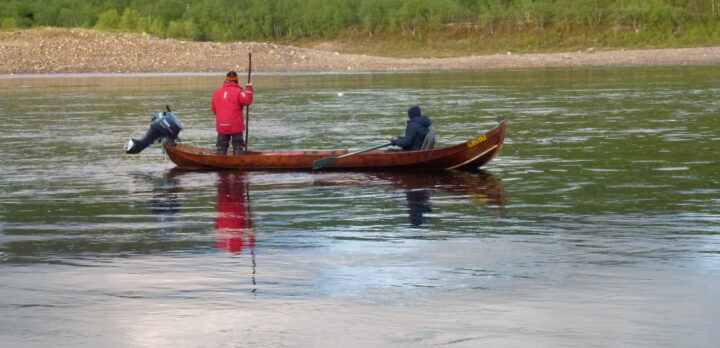Based on research conducted as part of the SALCUL project, which focused on bridging of knowledges and local and government salmon management systems especially in the Deatnu/Tana river region, we here describe the degree of inclusion of ILK and thereby empowerment of Indigenous and local knowledge holders in local and national salmon management in Norway, and point to two dimensions which are key to bridging diverse salmon knowledge and management systems also internationally. We utilize the concepts of participation in knowledge production and in management to gauge the degree to which Indigenous and local knowledge holders are empowered, using an adapted version of the Ladder of Participation (LOP) of public groups in national resource management which spans from being ignored to holding self-determination in salmon management.
Indigenous Knowledge: Ignored or symbolic inclusion in salmon science
Indigenous knowledge, which for the Deatnu/Tana region means Sámi knowledge, is to a high degree ignored in Norwegian salmon management. This pertains especially to the use of Sámi language and terminology for salmon, its productivity and ecosystem interlinkages, which are currently not systematically translated between languages or taken into account in the scientific knowledge basis for salmon management. Scientific concepts such as spawning stock target, stock assessment and monitoring dominates the scientific approach to salmon management while Sámi concepts for monitoring salmon well-being based on knowledge of its need for restoration and rest, as well as knowledge of fisheries as related to water levels are excluded (see especially Solveig Joks, doctoral dissertation: Laksen trenger ro). Through publications on Sámi terminology for salmon by Sámi themselves (e.g. Aage Solbakk) and the ecological history of the Deatnu/Tana river (e.g. Steinar Pedersen 2022), the use of references to Sámi concepts for the size of salmon and different stages of salmon such as smolt (veajehat) is increasing also in scientific reports. This is a development that clearly empowers Sámi knowledge holders but which is limited to symbolic inclusion in the scientific knowledge basis for management.
Local and Indigenous knowledge holders participate in management at the local and national levels
Local knowledge holders however participate in salmon river management at many levels and also collaborate with salmon scientists at several stages of research such as in data collection and in discussion of science-led salmon research and monitoring efforts. An example is the yearly counting and monitoring of salmon where inputs from local and Sámi knowledge holders of the conditions for salmon in diverse tributary rivers to scientists are essential in order to gather data. Another example is the involvement of local management bodies in commissioning research based on their own research priorities, such as investigating the amount of predators on salmon in the Deatnu/Tana watercourse. At the national level, there is currently no Sámi participation on national scientific salmon boards, even though the Sámi Parliament can consult with national authorities on salmon regulations.
Indigenous participation at the international level
At the international level, the Sámi Parliament participates in key government-led forums such as NASCO which holds the overall management decision-making power for Atlantic salmon. Through the SALCUL project, an indigenous-led international network of Indigenous Salmon Peoples (ISP) has also been developed and continues from its first Gathering in Vancouver, British Columbia, Canada, between October 1st to 3rd. Building alliances and networks with other Indigenous Salmon Peoples can empower indigenous peoples towards greater participation in both knowledge production, through a focus on customary use of salmon, and in management, through bringing to attention the rights of Indigenous peoples to participate in resource management following from international declarations such as the UNDRIP.
Empowering Indigenous Peoples through Increased Participation in Decision-Making and Research
A key outcome from the ISP Gathering in British Columbia was the diversity of approaches and concerns expressed by the around 30 different Indigenous peoples and First Nations present at the Gathering. While the focus of the CBD and other international instruments lie on traditional knowledge and sustainable customary use, the presentations and discussions among the participants first and foremost expressed a concern with these as a part of a much bigger picture: The survival of salmon and people as species in a world in dramatic change. Declines in salmon runs in major rivers such as the Yukon and in the Deatnu/Tana river holds implications for the wellbeing and health of people including elders, youth, mothers, and community functions, which go far beyond the simple concerns of transfer of traditional knowledge and customary practices from generation to generation. The key fact that “without salmon, no life” overruled all other concerns, lead the focus to first and foremost be centred on the survival of salmon as a species in the face of climate and biodiversity change, as well as indigenous-led salmon conservation. When it comes to Indigenous knowledge, a key message was that integration of indigenous knowledge in Western salmon management depends on acceptance by the leading scientists who provide scientific advice to the authorities, such as assessment and monitoring groups, which presupposes the participation of indigenous peoples or ILK experts in key fora. Building alliances across Indigenous groups with a shared goal to increase representativity of Indigenous peoples in international forums can be one way forward to increased empowerment for Indigenous and local knowledge holders.
Läs artikeln på svenska: Laxens liv – en fråga för olika kunskapstraditioner

